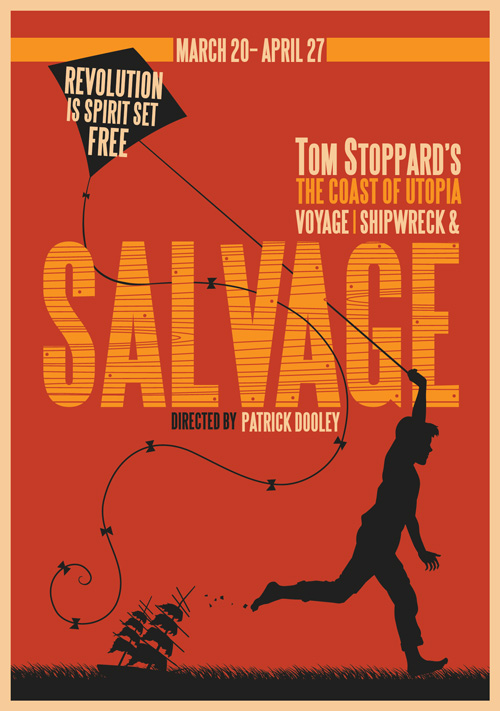
 "It's been well worth the wait... a thrill to watch." - Robert Hurwitt, San Francisco Chronicle
"It's been well worth the wait... a thrill to watch." - Robert Hurwitt, San Francisco Chronicle
"Under Dooley’s fine-tuned, insightful direction... every word seems spoken from the deepest of personal conviction." - Jean Schiffman, San Francisco Examiner
"Shotgun has taken a very complex series of plays, with difficult language, numerous characters and copious scene changes, and succeeded in presenting intriguing and beguiling dramas … all with fine acting." - Emily S. Mendel, Berkeleyside
"The acting at Shotgun continues to be uniformly good" - Dianna Arnold, Piedmont Post
"Whether one only sees 'Salvage' or manages to experience Stoppard's trilogy in its entirety, this production is a powerful example of how good live theatre can be when done to perfection." - George Heymont, My Cultural Landscape
_______________________________________
Review, 'Salvage': 3rd time disarms in Stoppard trilogy
Robert Hurwitt
3/30/14
San Francisco Chronicle
The long wait is over. With Saturday's opening of "Salvage," the Shotgun Players' three-year effort to stage Tom Stoppard's immense, often-inspiring "The Coast of Utopia" trilogy is finally complete. It's been 12 years since the trilogy opened in London, eight since it hit New York, but it's been well worth the wait.
For the audaciously ambitious Shotgun crew, it's probably less of a wait than a salutary aging process. Artistic Director Patrick Dooley's grasp of Stoppard's epic exploration of 19th century Russian socialism has grown more sure-handed as he's opened a new section of "Coast" each spring - "Voyage," the first part, in 2012; "Shipwreck" last year. "Salvage" seems the most well-honed staging yet, but Dooley's been able to revisit and refine each of the others, with the whole trilogy running in rep (and several all-day marathons, starting April 5).
Not that "Salvage" is the dramatic climax of Stoppard's magnum opus. "Voyage" sows the exciting seeds of Russian revolutionary thought in the restless minds of the young Michael Bakunin and Alexander Herzen - among quite a few other competing intellectuals and several romances - in dangerously autocratic 1830s Russia. "Shipwreck," the most action-packed segment, follows Herzen's emergence as the father of Russian socialism through the passionate heights of 1848 revolutionary fervor in Paris and desolation of failure, amid a flowering of free love.
"Salvage," which takes place mostly amid the international radical emigre community in London in the 1850s and '60s, is more autumnal in tone. Herzen (a mesmerizing Patrick Kelly Jones), who's lost his wife, a son and many close comrades by now, is understandably depressed.
He'll find new hope, a new campaign to wage with his best friend, Ogarev (Sam Misner), and a passionate new romance (with the magnetic Megan Trout as Ogarev's wife, Natasha) soon enough. But a rising tide of young revolutionaries, dismissing him as irrelevant, forms a large, sniping chorus that keeps our investment in his efforts in check. Even the undiminished enthusiasm of Bakunin (Joseph Salazar), finding his place as the leading prophet of anarchism, serves to heighten our sense of Herzen's steadily waning influence.
It isn't all doom and gloom. Dooley and his very large cast - which includes his captivatingly self-possessed daughters Penelope and Josephine as four of Herzen's children - make generally good use of Stoppard's witty observations on London life and the plentiful acerbic sniping of the French, German, Russian, Polish, Hungarian and Italian exiles. Celebrations break out. Political arguments erupt with vivid clarity in tandem with the eloquently unspoken skirmishes for domestic control between Trout's Natasha and a forceful Caitlyn Louchard as Herzen's housekeeper.
Some of the roles are only passably well filled, and Richard Reinholdt - one of only seven actors (with Jones, Salazar, Louchard and John Mercer) - fails to register in the important part of the novelist Turgenev. But Jones and Trout, in particular, infuse the passions of mind and heart with a clarity that keeps the story riveting.
It's a thrill to watch Jones' Herzen think aloud or come alive at Mercer's and then Misner's proposals for publishing papers they can smuggle into Russia, and the triumph (though illusory) of their campaign for the emancipation of the serfs. There's a sad charm in Herzen and Ogarev's talks about Natasha, and a sweet humor in Ogarev's offbeat courtship of the prostitute Mary (the fine Danielle O'Hare). As in "Shipwreck," what distinguishes "Salvage" is Stoppard's skill in intertwining the crisply expressed battles of political ideas with the murkier, desperate gropings of the heart in a time of awakening sexual freedoms. Between Jones' scintillating verbal clarity and Trout's rich emotional transparency, "Salvage" is as compelling as it is wistfully expectant.
Shotgun Players shine with Stoppard
Jean Schiffman
4/02/14
San Francisco Examiner
Almost everything imaginable happens in the 15-year span that British playwright Tom Stoppard encompasses in “Salvage” — the last of his magnificent, Chekhovian “The Coast of Utopia” trilogy — onstage in the Shotgun Players’ production in Berkeley.
The plays, which follow a group of 19th-century Russian radicals from their university days onward, cover illicit love, death, and mental and physical deterioration, including lessons learned and relearned, dreams dreamed and destroyed, and more. But most of all, the intellectual men argue passionately about their beloved motherland and its oppressed proletariat.
“Salvage” finds them, in middle age, in exile in London with radicals from other European countries. The central character is the aristocrat Alexander Herzen (Patrick Kelly Jones), a grieving widower and writer-editor of the muckraking newspaper The Bell, which is smuggled back into Russia. (Most characters are true historical figures of the era, including novelist Ivan Turgenev and a brief appearance by Karl Marx, with bits of text taken from their actual writings.)
Many of the 13 scenes, which are juicy and succinct, are set in Herzen’s various London homes, where he lives with his three children and a stern governess (Caitlyn Louchard). When his drunken comrade Nicholas Ogarev (Sam Misner) and his neurotic wife, Natasha (Megan Trout), arrive, a ménage à trois eventually develops.
Political events occur, including the much-hoped-for death of Czar Nicholas in 1855 and the subsequent, equally anticipated but ultimately disillusioning freeing of the serfs. Poignantly, though, the characters in this talky (at times, it’s true, overly didactic), often funny and engaging drama will not see a successful revolution in their lifetime. And as one fiery young radical finally tells the peace-minded Herzen, “Forget that you were a great man — you’re a dead man.”
Director Patrick Dooley creates an enthralling world on Shotgun’s tiny stage, with accoutrements and an invigorating musical score (Matt Stines, sound design). The actors move seamlessly through celebratory party scenes, intense dialogue and moments of quiet, solitary brooding. The set changes, handled gracefully by costumed servants, provide welcome breathers for the audience.
Best of all, there is Stoppard’s gift for smoothly interweaving the personal and the political and a huge cast that fully realizes his multidimensional characters. Under Dooley’s fine-tuned, insightful direction, every gesture and detail is precise and revealing, every emotion feels palpable and every word seems spoken from the deepest of personal conviction.
Not to be missed: Shotgun Players’ ‘The Coast of Utopia’
Emily S. Mendel
04/03/14
Sir Tom Stoppard’s famous, award-winning trilogy, The Coast of Utopia (2002), centers on a group of Russian philosophers, radicals, anarchists and socialists in pre-revolutionary Russia (1833-1866). If the subject matter doesn’t sound enthralling, rest assured that one of Stoppard’s gifts is exploring arcane subject matters and infusing them with excitement, humanity and heart.
Shotgun Players produced the first two fascinating productions, Voyage and Shipwreck in 2012 and 2013. This year, the final and best, Salvage, as well as the first two plays, can be seen in repertory now at the Ashby Stage. Led by Artistic Director Patrick Dooley, Shotgun has taken a very complex series of plays, with difficult language, numerous characters and copious scene changes, and succeeded in presenting intriguing and beguiling dramas … all with fine acting.
Throughout the trilogy, we follow three main characters who are based on actual Russian historic figures. The first is Alexander Herzen (Patrick Kelly Jones), father of modern socialism and publisher, with Nicholas Ogarev (Sam Misner), of the influential mudslinging newspaper, The Bell.
Herzen is a total contradiction. As an illegitimate son of an extremely rich nobleman, he was left vast fortunes, yet he is responsible for creating the political climate that led to the 1861 emancipation of the serfs.
We also trace famed anarchist, Michael Bakunin (Joseph Salazar); and the prominent Russian novelist, Ivan Turgenev (Richard Reinholdt). Recreated also are many other Russian poets, dreamers and radicals, who appear and disappear throughout the trilogy. The plays also explore the love lives of the Russians, whose avant-garde politics are matched by their frequent and broad-minded liaisons.
In Act 1 of the first play, Voyage, we meet a circle of young Russian university students who are followers of the Decembrists, the Russian army officers who, in 1825, were hung or exiled for protesting against Tsar Nicholas I’s assumption of the throne. Our student group first meets in the summer of 1833 at Premukhino, the vast Bakunin family estate at which Michael Bakunin and his four sisters reside. The group strains under the militaristic reign of the despotic Tsar Nicholas and adopts the forward-thinking German Idealism movement of Kant and Hegel. As time moves on to 1841, the somewhat adolescent philosophical debates have matured, but the political strife has worsened.
Act 2 gives us a fresh look at nearly the same years, 1834 to 1844, but in Moscow, not at the Bakunin estate. The contrast is stimulating, but not entirely successful. The political discussions continue to engage, but much confusion is caused by the introduction of new characters, in addition to all the personalities we met in Act 1.
In the next drama, Shipwreck, Alexander Herzen and his family have the opportunity to leave Russia for Paris in order to find medical help for his deaf son. Others in the circle also find their way to Paris. Although they are joyful at the onset of 1848 French Revolution, they are disillusioned and disheartened when French voters soon after choose to return to a monarchy.
The final play, Salvage, finds Herzen in London from 1853 to 1868. After the false start of French Revolution in 1848, he is at a low point in his personal and political life. Then, in 1855, Tsar Nicholas dies, and the reign of his successor, Alexander II, brings reforms. Bakunin is released from years in prison and exiled to Siberia. From there, he escapes and travels around the world to London. Herzen’s reunion with Bakunin, Turgenev and Ogarev leads to the founding of muckraking sheet, The Bell and, ultimately, to the 1861 emancipation of the serfs. Yet their joy at these events is soon dampened by a new generation of young radicals who insist on more immediate change, regardless of the consequences.
So, you may be wondering, why this internationally acclaimed trilogy is being produced by the Shotgun Players as opposed to a larger theater company? As he tells it, Artistic Director Patrick Dooley took a chance and filled out a form to obtain rights to The Coast of Utopia from the authorizing clearing house. Much to their surprise, Shotgun was granted the rights, apparently by an unknowing clerk, despite the fact that, simultaneously, Stoppard and his agent were in negotiations with A.C.T.
After verifying that the Shotgun legitimately obtained the rights, Stoppard then called Dooley and asked whether the company knew what they were getting into. Stoppard said that he admired Shotgun’s ambition. I suspect that he would now admire Shotgun’s achievement.
Stoppard writes engrossing, academic and intellectually stimulating drama, and The Coast of Utopia is one of his masterpieces and shouldn’t be missed.
Stoppard’s Salvage in fine production at Shotgun Players
Dianna B. Arnold
4/09/14
Piedmont Post
Shotgun Players’ production of Tom Stoppard’s Salvage is the last play of The Coast of Utopia trilogy. Salvage continues the story of Russians and other European revolutionaries in exile, with a setting in London and Switzerland.
At the onset the main character, Alexander Herzen, is a widower living in London with his three children, a nanny and a new German governess in a house which is at the center of radicals plotting a Polish revolution, a French revolution, and insurgencies in Germany, Italy and Hungary.
Philosophical dialogues continue, although by 1853, a division is forming between those who want to push for incremental, non-violent change– “progress by peaceful steps” – and those who are well content to have “every step forward . . . celebrated by a pile of corpses.”
Nihilism is on the rise and the younger generation feels that actions should be governed only by chemistry.
Herzen’s best friend, the poet Ogarev, and his wife show up much to everyone’s delight, except that of the German governess. When the Tsar Alexander II frees the serfs in 1861, Herzen’s approach seems to be vindicated and Herzen and his best friend’s wife together conceive twins in the ecstasy of celebration. The unusual living arrangements of the household, with Ogarev bringing in a London “fancy woman” and her son to live with them, reflect both the iconoclasm of these revolutionaries and the importance of love and inclusive family.
The anarchist Bakunin appears again, fresh from the Peter and Paul fortress and eager to foment new unrest. Revolution is the spirit set free, he tells Herzen. “It is the self in harmony with the universe,” Bakunin claims. Herzen shakes his head. “Without order you don’t have paradise, you have chaos.” Herzen comes to conclude that life is a continual struggle to work and do good, relieved only now and then by “the summer lightning of personal happiness.”
The final scene is telling. In the center of the stage is Herzen’s family, with everyone gathered around the new grandchild. Off to the side Karl Marx descries the new world that will be built on the utter destruction of the old. Thus, we see the dialectic of life: with the family as thesis and revolution and death as the antithesis. What comes after? The terrible wars of the 20th century? The movement toward universal democracy? And what of our own young century?
The acting at Shotgun continues to be uniformly good in Salvage, with most of the cast reprising roles performed in the two other segments of the trilogy, Shipwreck and Voyage. Patrick Kelly Jones as Alexander Herzen and Richard Reinholdt as Ivan Turgenev continue to delight. Megan Trout as Natasha and Sam Misner as Ogarev are also notable. As with the first two plays, the many changes of time and place are imaginatively handled by curtains and a few pieces of furniture.
Undeniable Labors of Love
George Heymont
04/09/14
There are many who would argue that Richard Wagner's 19-hour tetralogy, Der Ring des Nibelungen, is the greatest piece of performance art to be created during the 19th century. Not only does the composer's use of leitmotifs help to anchor and further the story, it adds an extra dimension to the Norse sagas which inspired this massive undertaking.
If one were looking for a narrative piece about social injustice and political revolution, one might point to Victor Hugo's 1862 historical novel, Les Misérables, which received a new lease on life in September 1980 with the Paris premiere of an adaptation for the musical stage (with book and music by Alain Boublil and Claude-Michel Schonberg). But what if you were looking for something smaller and less operatic than Wagner's Ring cycle but more intellectual and less showy than Les Miz?
You'd find yourself exploring Tom Stoppard's 2002 trilogy, The Coast of Utopia (which consists of Voyage, Shipwreck, and Salvage). Over the past three seasons, the Shotgun Players has been building toward this spring's chance to present marathon days in which audiences can be transfixed by the entire trilogy. As Patrick Dooley (the company's artistic director who staged the trilogy) remarks in his program note:
"For the past three years, I've had the pleasure of absorbing the agony and ecstasy of the nearly seven-hour drama appearing before you. Over this time, the depth and breadth of this piece has continued to give me great consolation as I have navigated the pitching flotsam and jetsam of my own life. Like any great work, it reveals itself anew with each conversation, each reading, each rehearsal. The complexity of language and imagery is the closest to Shakespeare I've ever experienced and yet its ultimate message (as I see it today) is almost childlike in its simplicity: Do your best, while hurting the least. The genius of evolution (both political and personal) is only possible with the gifts of hardship and adversity. Yes, we continue to see certain tragedies circle back around, but they are usually just echoes of the past. The wheels of progress may turn slow, but they are sure."
With its large cast, historic narrative, and epic sweep, The Coast of Utopia is much more about philosophy and personal relationships than about pomp and pageantry. The challenge for the Shotgun Players team was to find a way to produce this massive work with a tiny budget on a postage stamp sized stage while still managing to "bring the magic."
Much of this has been accomplished by a creative team whose intense dedication and vivid imaginations have been focused with laser-like clarity on their singular artistic vision. Thanks to the production's immensely talented set designer Nina Ball, costume designer Heidi Hanson, and director Patrick Dooley, I was pretty much gobsmacked by how superbly the mid-19th century was evoked, how meticulously scene changes were effected, how seductively the audience was introduced to the politics, neuroses, and physical ailments of certain characters -- and how Stoppard's drama unfolded within the confines of the tiny Ashby Stage with a heartbreaking sense of historical sweep and dramatic momentum.
This doesn't happen easily in most theatre companies (whatever their size), which is why the scope of Shotgun's achievement should not be taken for granted. Staging Stoppard's trilogy is a monumental undertaking (each installment by Shotgun's talented ensemble has been given the utmost love and attention). The production of Salvage was anchored by the remarkably versatile Patrick Kelly Jones as Alexander Herzen with an impassioned performance by Megan Trout (doing some of her finest work in recent years) as Natasha Tuchkov.
Strong support came from John Mercer (Worcell), Sam Misner (Nicholay Ogarev), Richard Reinholdt (Ivan Turgenev), Dan Saski (Karl Marx), and Caitlyn Louchard (Malwida). Sachi Granich (Tata), Daniel Petzold (Nikolay Chernyshevsky), Joseph Salazar (Mikhail Bakunin), Kenny Toll (Nihilist) and Trish Mulholland (Mrs. Blainey) contributed finely-etched cameos in smaller roles.
Whether one only sees Salvage or manages to experience Stoppard's trilogy in its entirety, this production is a powerful example of how good live theatre can be when done to perfection. Kudos to Dooley and his devoted community of talented artists.





